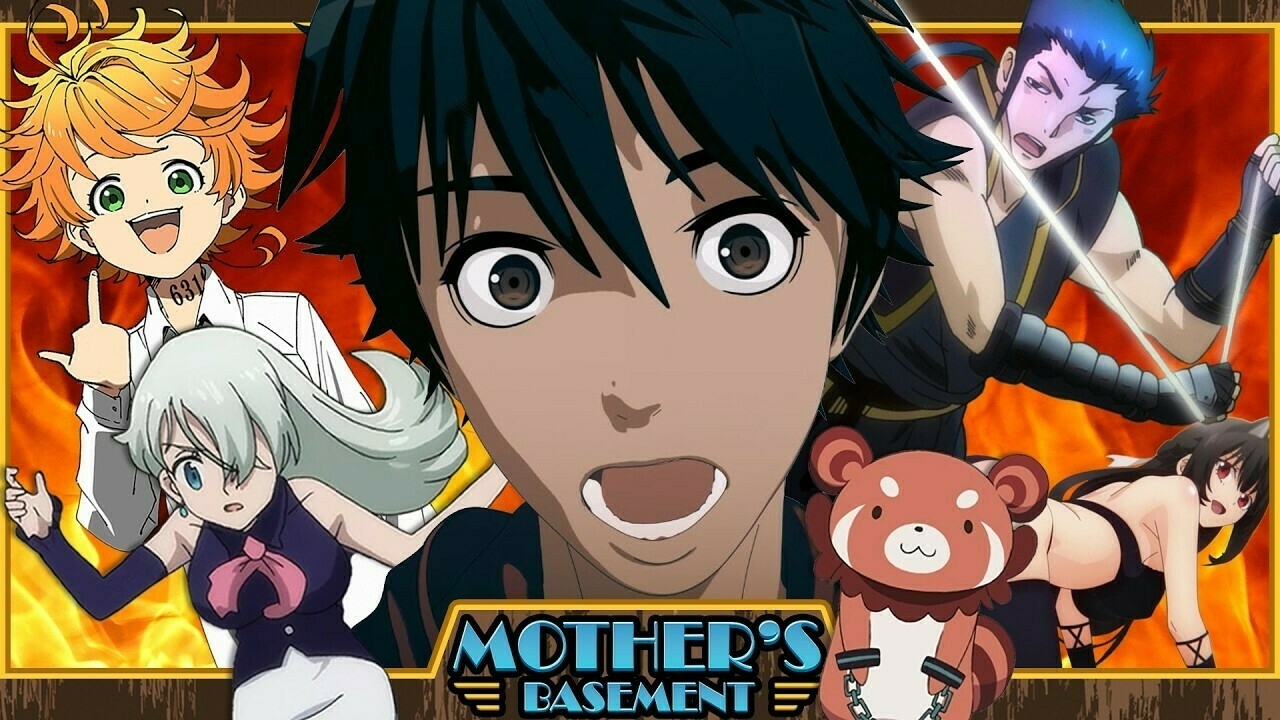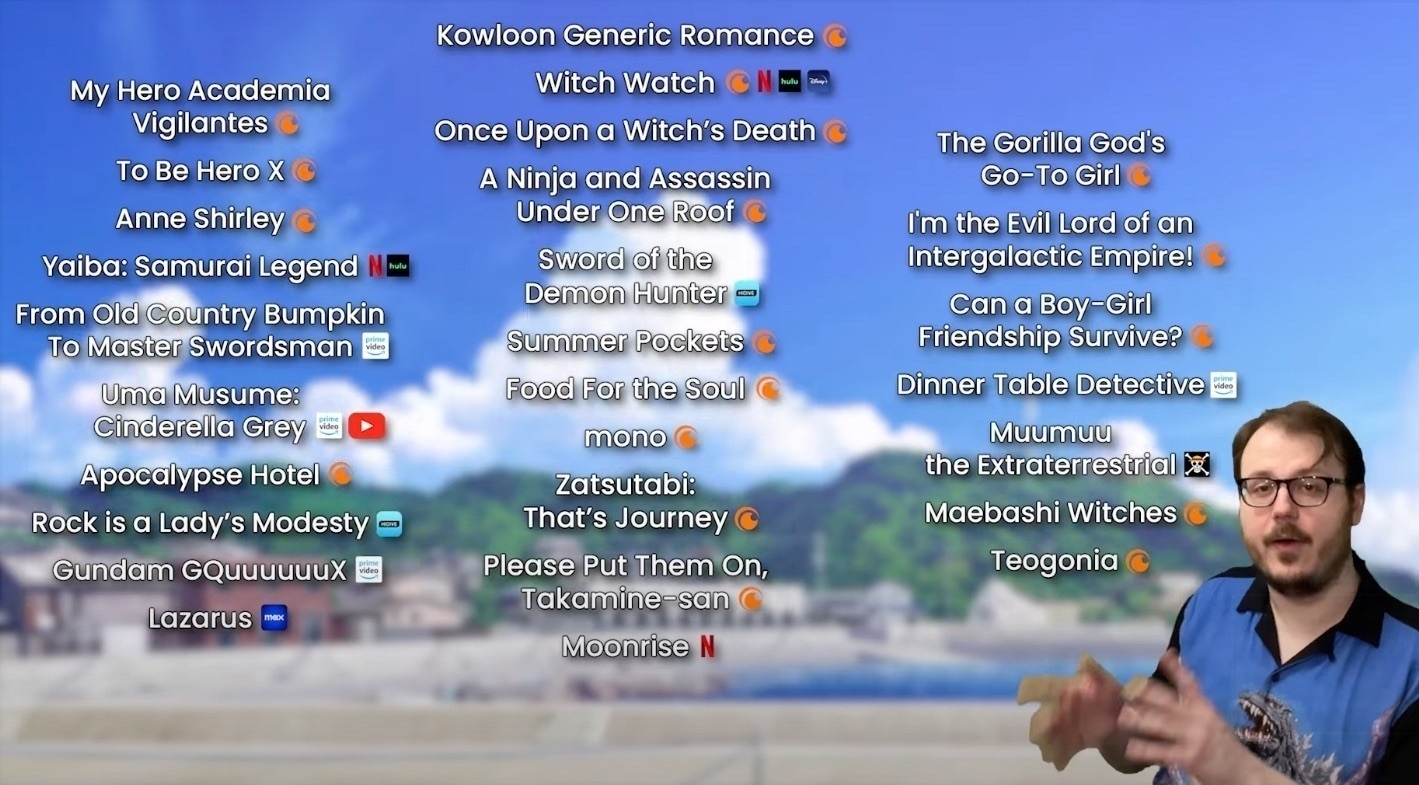Category: television
You are viewing all posts from this category, beginning with the most recent.
Hottest Trash Anime Master List - Spring 2025

It’s that time again! Every three months, or “cour” as seems to be the preferred terminology, Geoff Thew puts out his guides for Best and Worst #anime of said season. This round is for the freshest trash for Spring 2025. Make sure to watch along… youtu.be/PCNT1xSW3…
Trashpettizers
- Rock is a Lady’s Modesty
- From Old Country Bumpkin to Master Swordsman
- The Shiunji Family Children
- Can a Boy/Girl Friendship Survive
- Classic Star Stars
- Please Put Them On, Takamine-san
- Yandere Dark Elf: She Chased Me All the Way From Another World
Fantasy & Isekai
- The Beginning After the End
- The Brilliant Healers New Life in Shadow
- Unaware Atelier Master
- The Too Perfect Saint Tossed Aside by My Fiancé and Sold to Another Kingdom †
- The Gorilla Gods Go-To Girl
The Hottestest Hot Trash
- I’m the Evil Lord of a Galactic Empire
† Longest title award for the Spring 2025 Trashies.
A friend of mine just sent me a link to Brent Spiner’s comedy series on YouTube called Fresh Hell, and I NEED to share it! There’s a second season under Videos on the Channel page. #StarTrek #STTNG #TV #comedy www.youtube.com/playlist
The WORST Anime of ALL TIME - 10th Anniversary: The Complete List

Part of the payment I must make to Satan to save my soul from eternal damnation is to prepare a detailed listing of all anime that Geoff lists in his Mother’s Basement videos on YouTube. Just kidding. I do it because I love it and want to help peeps retain the font of knowledge that Geoff shares with us in his various videos. Today’s video is a comprehensive breakdown of the ten worst anime of all time. Yes, the worst of the worst or the animated equivalent of emotional torture.
NOTE: This is a list of anime series to AVOID. These shows are NOT like the Hottest Trash which you can watch because sometimes bad == good. So, please don’t watch these, unless you’re a sadist… or a masochist who wishes to inflict emotional pain on unsuspecting victims. Knowing, according to G.I. Joe, is half the battle. Be kind. Spare your mind.
Now for the list. I’m sorry:
- Rent-A-Girlfriend or How to make your entire cast unlikeable
- The Promised Neverland Season 2 which never happened and makes people really mad
- Conception: How to make babies then use them to fight wars
- Seven Deadly Sins … “Really, I blow away mountains for breakfast.” - a mountain. Oof.
- My Life as Inukai-san’s Dog which is about… um, “animal husbandry” but borderline illegal?
- The Happy Science Collection: Religious cults, brainwashing, & propaganda for children!
- The Irresponsible Galaxy Tylor. I’ve never been more ashamed, and now consider it misspelled.
- Hand Shakers or Motion Sickness: The Animation, now with more sexual perversion!
For the coup de gras Geoff combines the two worst into a Mega Worst, both of which just happen to be Crunchyroll Originals:
2 (and 1). Ex-Arm - All the Don’ts and None of the Do’s of Anime & Visual Storytelling 1 (and 2). Gibiate - Mind control agitprop films for insane people being held at CIA blacksites
Once again I feel the need to remind you of the psychological damage that you can incur from viewings of the above listed media. Please take this list as a warning and keep this guide handy when reviewing new series to add to your watchlist in order to avoid accidental damage to the psyches of you or those you care for.
For additional details, please refer to the original source: www.youtube.com/watch
I love Mobile Police #Patlabor, an #anime #mecha series unlike any other. It’s been around for a very long time and will be returning next year with Patlabor EZY. If you are new to Patlabor, check out STEVEM’s fantastic retrospective. #animation #TV #movies #scifi #mamoruoshii www.youtube.com/watch
I would be remiss if I didn’t mention the loss of #TV icon George Wendt, known worldwide as Norm Peterson from #Cheers. Kottke posted this supercut of every time Norm walked into the bar. Pure gold way to celebrate pure gold. #obits #GeorgeWendt #TooSoon kottke.org/25/05/sup…
For oldsters: Watch this video to confirm your admiration for these shows. For youths: Watch this video to find new shows that’ll blow your mind. Conclusion: Any list that includes Cowboy Bebop must be accurate. That is all. #scifi #tv #90s youtu.be/uT42ldiYM…
Wow. How odd. #StarTrek #scifi #STTNW #SpongebobSquarepants #TV #animation www.youtube.com/watch
I legit sat and stared at the screen for like ten minutes after watching the pilot. GLITCH, creators of The Amazing Digital Circus, has a new series called The Gaslight District and it’s amazing. You’ve never seen anything like this. #animation #pilot #TV #adultanimation www.youtube.com/watch
The BEST Anime of Spring 2025 - Ones To Watch
If you’ve gotten your fill of trash, Geoff has also posted his picks for the best new shows of the Spring cour of 2025 on his main channel, Mother’s Basement. This is a list of all the shows he mentions. Print it out and use it as a crib sheet to track what you’re interested in screening whilst you watch the episode. The main list follows, with additional lists for honorable mentions and the bargain bin. Enjoy all of your lost time!
The BEST Anime of Spring 2025 - Ones To Watch / Mother’s Basement
- My Hero Academia: Vigilantes
- To Be Hero X
- Anne Shirley
- Yaiba: Samurai Legend
- From Old Country Bumpkin to Master Swordsman
- Uma Musume: Cinderella Gray
- Apocalypse Hotel
- Rock is a Lady’s Modesty
- Mobile Suit Gundam: GQuuuuuuX (pronounced Gee-Kwaks)
- Lazarus
Honorable Mentions
- Kowloon Generic Romance
- Witch Watch (cut from video)
- Once Upon a Witch’s Death
- A Ninja and Assassin Under One Roof
- Sword of the Demon Hunter
- Summer Pockets
- Food For the Soul
- mono
- Zatsutabi: That’s Journey
- Please Put Them On, Takamine-san
- Moonrise
Bargain Bin
- The Gorilla God’s Go-To Girl (Gal?)
- I’m the Evil Lord of an Intergalactic Empire
- Can a Boy-Girl Friendship Survive
- Dinner Table Detective
- Muumuu the Extraterrestrial
- Maebashi Witches
- Teogonia

If you’ve been crouching in a closet moaning to yourself about how long it’s taking to get Season 3 of #StarTrekStrangeNewWorlds, it seems we might have an official date from SkyShowtime Netherlands. It’s August 1st. That’s it for now. #StarTrek #STSNW #scifi www.youtube.com/watch